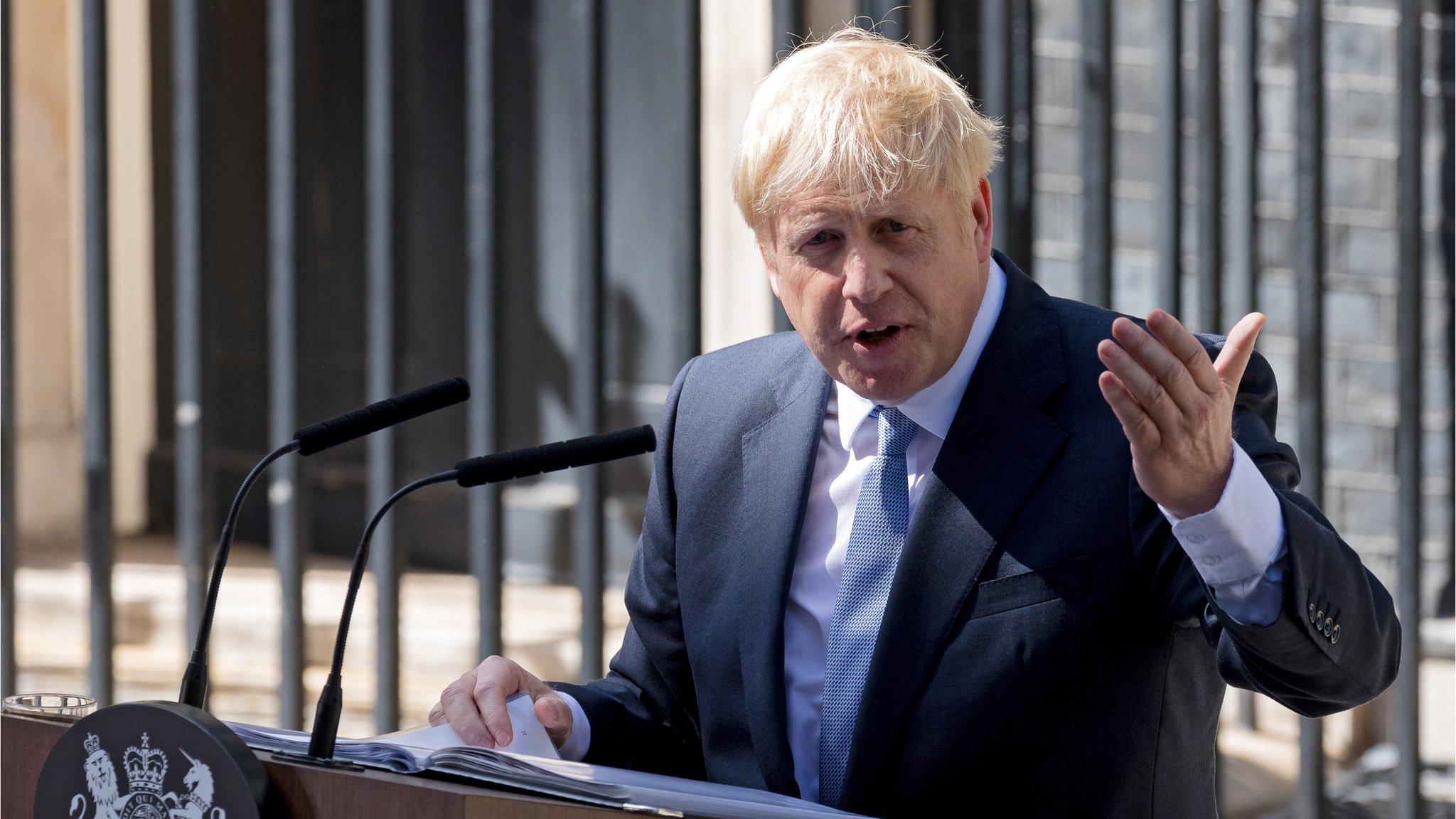Boris Johnson: Premiership will be the start of a golden age
- Published
- comments
Boris Johnson says Britain would be “clean, green, prosperous, united, confident and ambitious”.
Boris Johnson has promised the "beginning of a new golden age", as he made his first Commons statement as PM.
Speaking to MPs, Mr Johnson said his government would throw itself into Brexit negotiations with energy, while Michael Gove would lead on no-deal planning as a "top priority".
He also said EU citizens living in the UK would have their rights protected.
But Downing Street was unable to confirm if there would be any new laws to underpin the commitment.
Tory MP Alberto Costa - who has campaigned for EU citizens' rights after Brexit - welcomed Mr Johnson's pledge, but said "the devil, as ever, is in the detail" and he would be "scrutinising how that guarantee comes forward".
Replying to his statement in the Commons, Jeremy Corbyn said people "do not trust" the new PM to deliver on his promises.
And Scotland's First Minister Nicola Sturgeon has written to Mr Johnson to say it is "essential" her country has an alternative option to his Brexit plan.
The statement came after the first meeting of Mr Johnson's new cabinet, who he said had all committed to leaving the EU on or before 31 October, "no ifs, no buts".
New secretaries of state include former leadership contender Sajid Javid as chancellor, and leading Brexiteers, with Dominic Raab as foreign secretary and Priti Patel as home secretary.
More junior ministers are expected to be announced later, with further reshuffling on Friday.
Mr Johnson has also held his first calls with other foreign leaders - including Dutch PM Mark Rutte and Australian PM Scott Morrison - and is due to speak to the European Commission President Jean-Claude Juncker later.
What did the PM say in his statement?
Much of Mr Johnson's statement focused on his plans for Brexit.
Despite emphasising the importance of preparing for no deal, the new prime minister said he would "much prefer" to leave the EU with an agreement, saying he would work "flat out to make it happen".
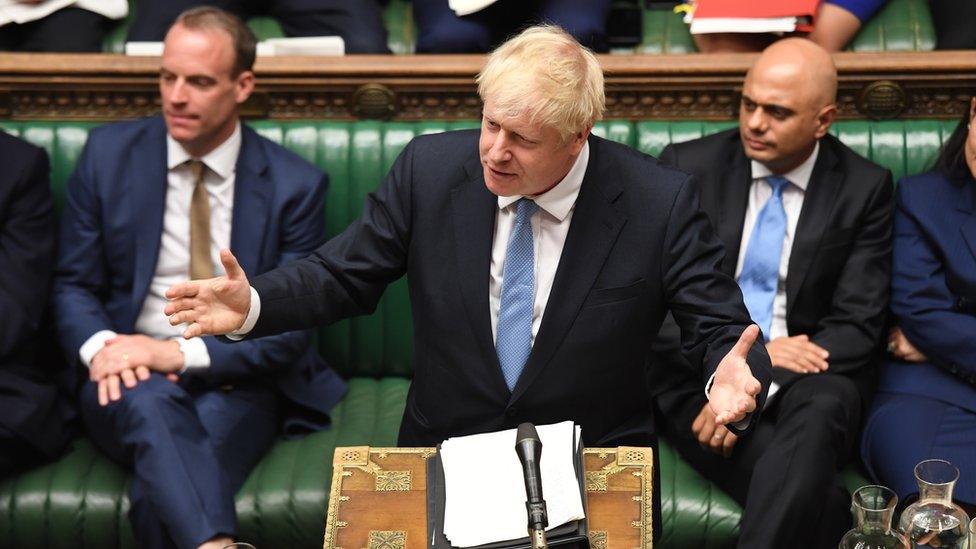
Boris Johnson gave his first statement to the Commons as PM, flanked by his new Foreign Secretary, Dominic Raab (l), and his new Chancellor, Sajid Javid
However, he told MPs the withdrawal agreement his predecessor, Theresa May, had negotiated with the EU was "unacceptable to this Parliament and to this country".
That plan was voted down three times by MPs, with one of the controversial parts being the Northern Ireland backstop - a mechanism to avoid physical checks on the border between Northern Ireland and the Republic of Ireland in case no trade deal is agreed between the UK and the EU by the end of the transition period.
Mr Johnson has pledged to scrap this element of the plan, saying alternative arrangements to keep checks away from the border were "perfectly compatible" with the Good Friday Agreement - the peace agreement signed in 1998.
The EU's chief Brexit negotiator, Michel Barnier, said eliminating the backstop from the withdrawal agreement was "unacceptable", and after Mr Johnson's "rather combative speech", the bloc would have to "be ready for all scenarios".
The EU Commission's President, Jean-Claude Juncker, also underlined the EU's position in a call with Mr Johnson, saying the withdrawal agreement negotiated between the bloc and Mrs May was "the best and only agreement possible" for Brexit.
Jeremy Corbyn gives a warning to the people who will "lose out" in a no-deal Brexit.
Addressing MPs, Mr Johnson also said he would be looking into changing the UK's immigration system, as per his leadership campaign pledge.
He wants to bring in a points-based system, similar to that used by Australia, and he said he would be asking the Migration Advisory Committee to conduct a review, "the first step in a radical rewriting" of the policy.
The PM's spokesman later said that further details of Mr Johnson's plans would be revealed "in the coming days and weeks".
Labour's leader said the country was "deeply worried the new prime minister overestimates himself".
Mr Corbyn added: "People do not trust this prime minister to make the right choices for the majority of the people in this country when he's also promising tax giveaways to the richest of big business - his own party's funders [a policy Mr Johnson proposed during the leadership campaign]".
He also asked the PM to rule out "once and for all" the NHS would form part of a trade deal with the US, following comments made by President Donald Trump on his visit to the UK in June.
Mr Johnson said: "Under no circumstances would we agree to any free-trade deal that put the NHS on the table."
What did Mr Johnson tell cabinet?
After a raft of resignations, sackings and appointments on Wednesday night, Mr Johnson addressed his cabinet for the first time as prime minister early on Thursday.
He told the cabinet they had "a momentous task ahead", as he repeated his commitment for the UK to leave the EU on 31 October - calling it "a pivotal moment in our country's history".
He said the new team respected the "depth and breadth of talent in our extraordinary party", who were "not going to wait until 31 October to get on with a fantastic new agenda for our country... delivering the priorities of the people".
Boris Johnson holds his first cabinet meeting since becoming prime minister.
The appointments have already faced criticism from the opposition, with the chair of the Labour Party, Ian Lavery, calling it "a cabinet of hard-line conservatives who will only represent the privileged few".
He comments were echoed by independent MP Nick Boles - who resigned the Conservative whip over Brexit - saying the "few elements remaining of the liberal one-nation Conservative style are neutered captives in this cabinet".
But the new Leader of the House, Mr Rees-Mogg, who led the pro-Brexit Tory European Research Group (ERG), denied there had been a "Leave" takeover of the cabinet.
"Boris is bringing the country together, the party together, through his cabinet appointments," he said.
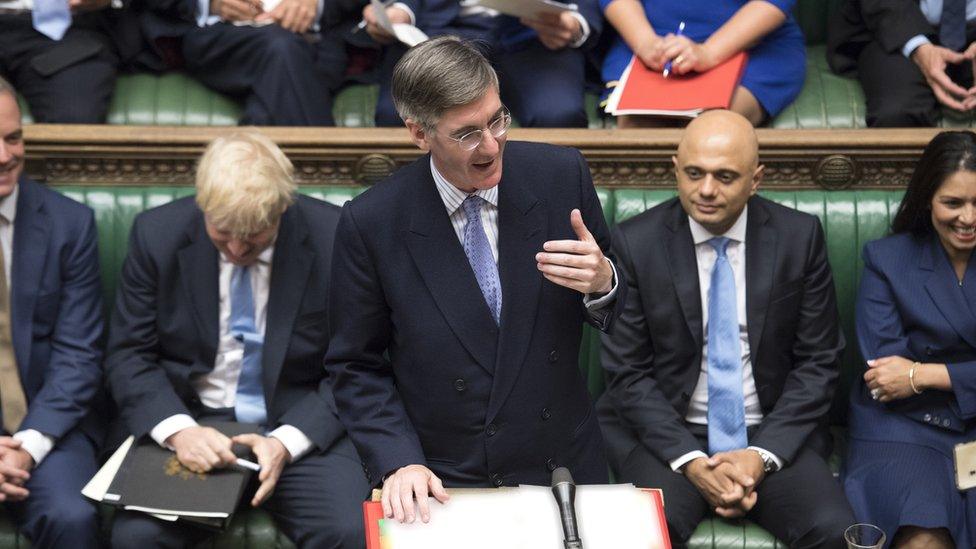
Jacob Rees-Mogg held his first business questions on Thursday after his appointment as Leader of the House
The newly appointed Lib Dem leader, Jo Swinson, has tabled an early day motion expressing a lack of confidence in the prime minister - although such motions are rarely debated and generally used to draw attention to an issue.
31ministers entitled to attend - up from 29 under Theresa May
48average age - down from 51
26%female - down from 31%
12Leave supporters (in 2016) - up from six

'A prime minister in a hurry'

These are the decisions of a prime minister in a hurry.
One who is aware that he's up against the clock. One who has to pull off - within a few months - what his predecessor could not manage over years.
The team surrounding Boris Johnson has been put together with one goal in mind - to help him keep the promise he's made, to see the country leave the European Union in good time.
No 10 believes it shows strength of purpose - a new administration determined and willing to take decisions after years of drift and disappointment.
Brexit believers have the top roles. But it is not a cabinet made up purely of the most burning Eurosceptics.

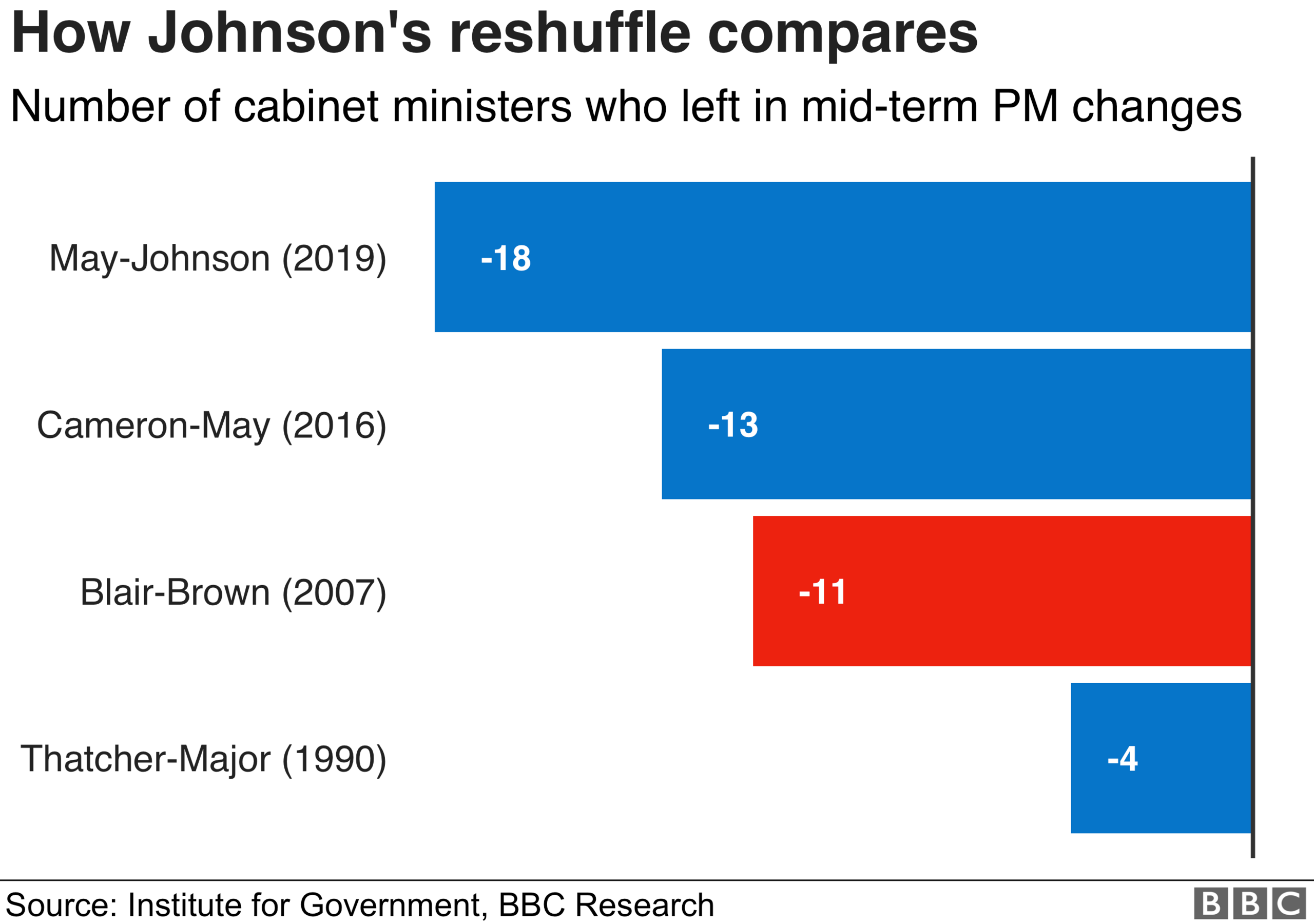
Correction 5th August 2019: This article has been amended after an earlier version inaccurately described the purpose of the Northern Ireland backstop.
- Published25 July 2019
- Published14 February 2020
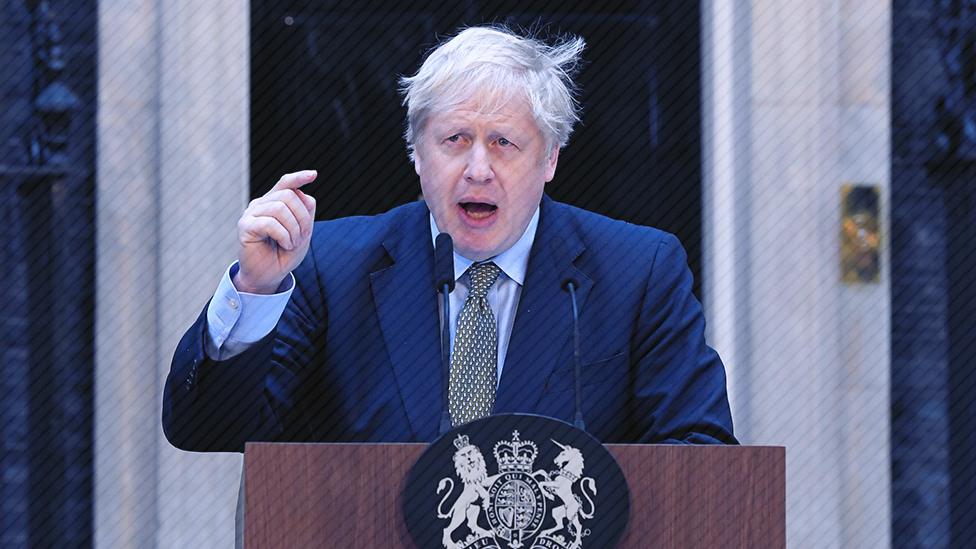
- Published24 July 2019
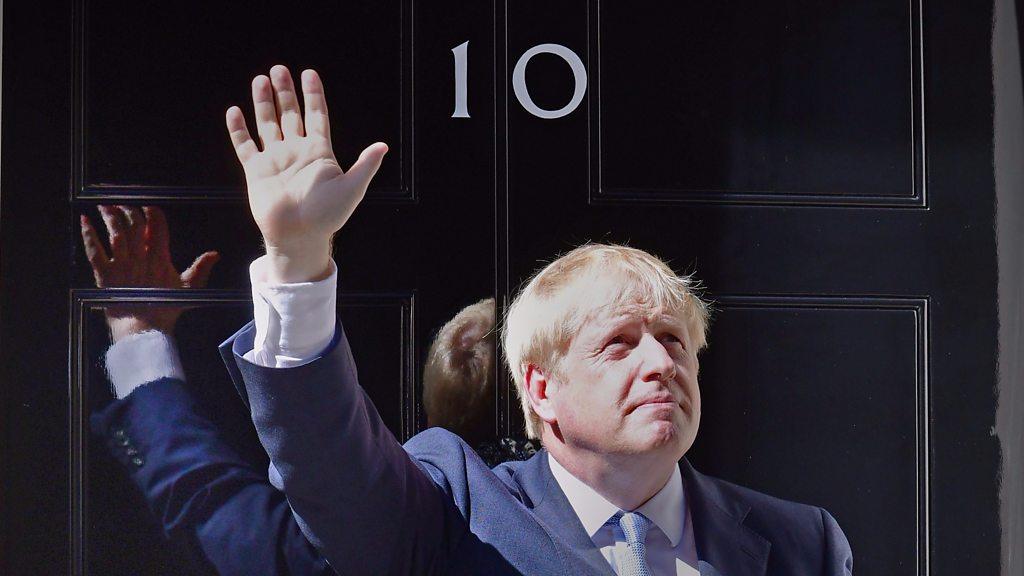
- Published24 July 2019
